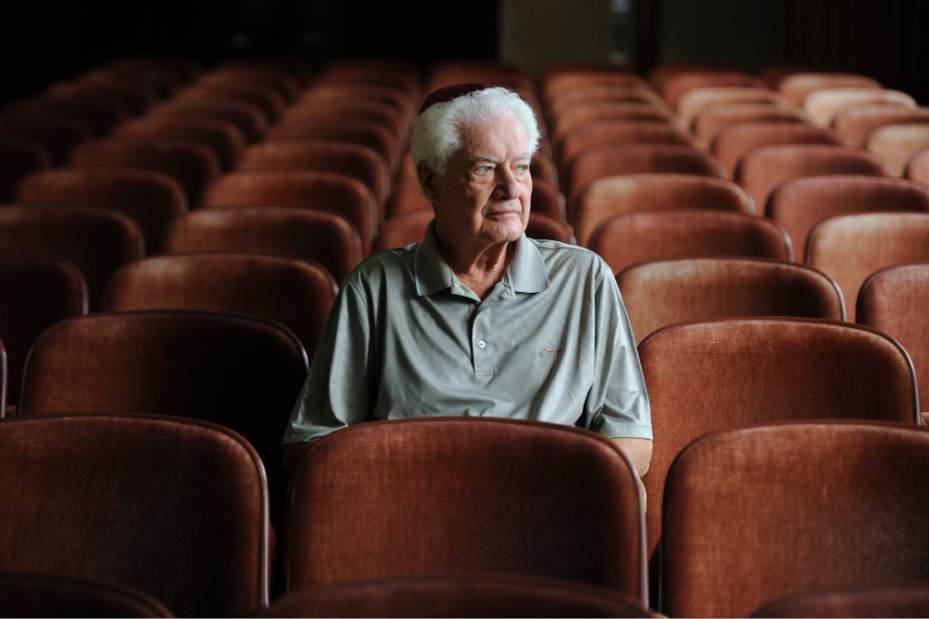https://archive.triblive.com/local/westmoreland/jewish-congregations-dwindling-forced-to-mull-viability-of-worship-sites/
Jewish congregations dwindling, forced to mull viability of worship sites

Brian F. Henry | Trib Total Media
Jack Bergstein has been a member of Temple Beth Am in Monessen since 1940. In its early days, there nearly 150 families attended services there, but once the steel mills closed in the 1980s, there was a distinct change in the size of the congregation. There now are 20 families that attend.
At Beth Israel Congregation in Latrobe, a small classroom houses only one desk and a few old toys.
“We used to have a Hebrew School. ... of course, that was a long time ago,” said Mickey Radman, 84, who has attended the Weldon Street Jewish house of worship since 1958, four years after the building was dedicated.
He can recall when, on High Holy Days, chairs were placed outside the 80-person sanctuary to accommodate overflow. The congregation now struggles to gather the 10 required for minyan, or a quorum for prayers.
In Monessen, the last student at Temple Beth Am attended services five or six years ago, said Jack Bergstein, 75, who has attended the synagogue since he was born.
“There are no young members at all,” he said. He recalls when 150 families belonged. Now, there are about 20.
At Temple Hadar Israel in New Castle, President Sam Bernstine, 59, is one of the youngest of 20 to 25 regular attendees who hold the congregation together.
Members of the three synagogues must make a decision about closing — despite decades of history, artifacts and the emotional connection to the spiritual places.
Jewish congregations are shrinking in small towns across the country, said Noah Levine, senior vice president for the Jewish Community Legacy Project. The Atlanta-based nonprofit is working with eight congregations in Western Pennsylvania.
These communities want to make informed decisions about their legacies, including difficult choices such as the sales of buildings, perpetual care of cemeteries and distribution of money into endowments, Levine said.
“We had identified the Pittsburgh region as an area with a lot of demographic changes due to changing communities,” he said.
The major changes in Western Pennsylvania began in the mid-1980s when the steel industry declined.
Once the mills closed, people started leaving, Bergstein said.
The Jewish Community Legacy Project has worked with the Monessen congregants for about two years, Bergstein said.
“No one wanted to talk about it until we heard about this project,” he said. “I think everyone has become more realistic.”
Smaller Jewish households
The number of Jewish people in the greater Pittsburgh area fell about 6 percent between 1984 and 2002, from an estimated 44,900 to 42,200, according to studies by the Jewish Federation of Greater Pittsburgh.
At the same time, the number of Jewish households increased 10 percent, from 19,000 to 20,900, accounting for about 3.8 percent of households in Allegheny County.
Those households may have increased, but may be smaller.
Two new congregations have formed, but the groups are less tied to a building such as traditional synagogues. Membership in synagogues is down 3 percent for the second year, said Raimy Rubin, manager of the Community Scorecard project that tracks data led by the Jewish federation.
Selling, archiving artifacts
Susan Melnick, archivist for the Rauh Jewish Archives, works with the “Small Town Jewish History Project” there to tell the stories of the small communities, even after the synagogues close.
“It's hard to know what will happen in the future,” Melnick said.
Radman at Beth Israel in Latrobe believes their next step is selling the synagogue and closing, shifting members to Greensburg's Emanu-El Israel for worship.
Services will continue for as long as possible at the New Castle congregation, where leaders plan to sell the building to a neighbor to use for physical and occupational therapy sessions. The congregation will rent it and keep up with services, Bernstine said.
“By selling the building, we're able to be more fiscally responsible,” he said. “Nothing changed. It's just that we don't have the facility upkeep and maintenance.”
When it comes to artifacts, all three synagogues are working with their congregations to decide such issues as selling or donating their torahs.
Bernstine said New Castle's artifacts will go to the Jewish archives or other museums, while the congregation plans to maintain a virtual “yahrtzeit” board. The memorial board will recognize anniversaries of family members who have died and send out reminder emails.
“That way, we're not going to lose touch, even if we don't have the boards up,” Bernstine said.
In Latrobe, the memorial board will go to Greensburg's congregation along with ones taken in from long-shuttered Mt. Pleasant and Connellsville congregations, Radman said.
Bernstine said he looks at his work with the Jewish Community Legacy Project as a “mitzvah,” or fulfillment of a Jewish commandment to return good deeds.
“The Jewish community was good to my family, and now I look back and see it's time for me to help the best I can,” he said. “For us in New Castle, it's not ending, it's just changing.”
Stacey Federoff is a staff writer for Trib Total Media. She can be reached at sfederoff@tribweb.com.
Copyright ©2026— Trib Total Media, LLC (TribLIVE.com)
